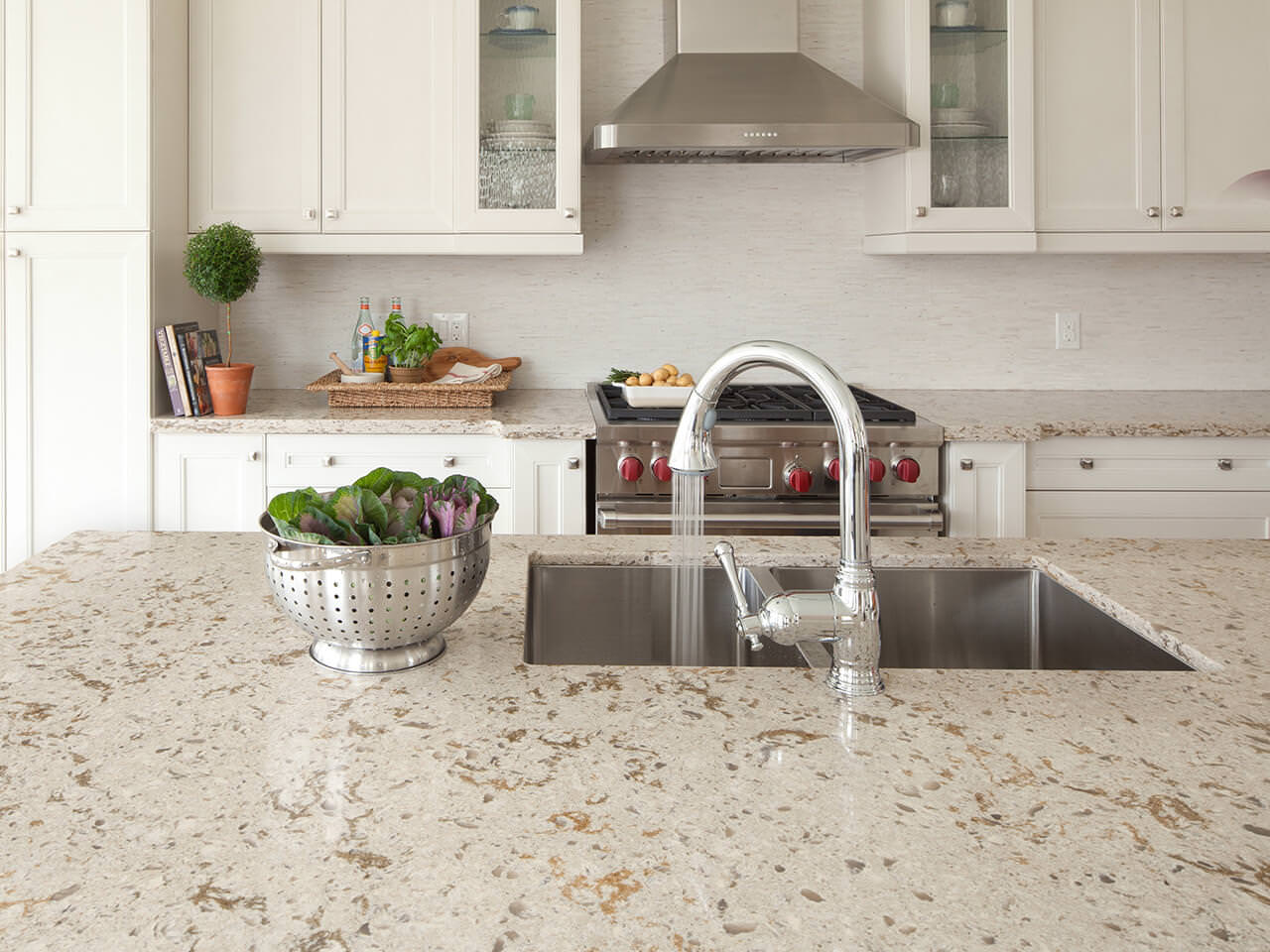
Quartz Countertops have become very popular among homeowners who are looking for a change in their kitchens. Replacing your outdated countertops with Quartz can turn an average kitchen into a stunning one, but is it right for your home? Here are the top 5 Facts about Quartz Countertops so you can make an informed decision before purchasing.
(For additional information read our article: What is Quartz?)
Fact #1 What does Quartz Countertops Cost?
The first thing most people want to know is how much does Quartz cost and how they compare in price to other popular options. The cost of Quartz varies depending on the quality and brand of the stone; you can expect to pay to start off anywhere from $50 per square foot, for less popular imported options, and up to $150 per square foot or possibly more.
Quartz is usually, but not always, a bit more expensive than Granite, depending on the quality and rarity of the natural stone. It’s much less costly than Marble over its life of use, but it’s more expensive than laminates or solid surfaces. The final cost depends on several factors, including the brand and thickness of the slab, how much material you need, the complexity of installing, and any other pre-construction services that your project may need before replacing or getting new countertops.
Fact #2 Where To Buy Quartz Countertops
You might be tempted to go to one of the big chain home improvement stores to purchase quartz countertops, but if you do, you’ll not only have a much smaller selection to choose from, odds are you will get a less-skilled contractor handling the installation. Instead, take the time and do some legwork checking out local countertop stores.
Avoid any place that tries to push one brand or style over another. You should feel no pressure to pick any other stone than one that you want. We recommend selecting a company that will provide you with an in-home design consultation.
Why an In-Home Consultation? Unlike Natural Stone slabs that have many flaws, like cracks and pits, Quartz slabs are made to be flawless. So driving around to find the perfect slab is not needed.
By having a local company provide you with an In-Home Design Consultation, you will be able to view all of the different colors of Quartz in the lighting of your home, against your cabinet color and flooring. Most Countertop companies that provide In-Home Consultations will send an expert that can assist you in choosing the best Quartz color. In addition to providing you with pricing for countertops, these experts will also help you select the proper backsplash, sink, and plumbing fixtures. Finally, they will measure the exact square footage required and provide you with a down to the penny cost for your project.
Fact #3 Quartz Countertops are Maintenance-Free
When you start shopping, you might be confused by its description as a ‘man-made or engineered stone. To create Quartz slabs for kitchen and bathroom countertops, manufacturers combine 93% ground natural quartz and add 7% resins, polymers, and colors. This combination allows for a tremendous variety of colors that look similar to natural stone.
Quartz is hard–it’s similar to Granite in that respect–but it has a few differences as well. While both are stone, only Granite is 100% natural. The resins and polymers used to create Quartz countertops make them completely non-porous, which means they will not stain. Granite is all-natural and can be very porous, meaning that if you don’t seal it correctly, you could see stains develop from even small spills of wine, coffee, and other commonly used liquids.
As a bonus, Quartz is also scratch and chip-resistant. The polymers and resins give it a little more flexibility than Natural Stone. Quartz and Granite are tough materials, though Granite is more likely to chip if you drop a heavy object on it.
In general, Quartz countertops are pretty low maintenance. In fact, some would say they’re maintenance-free. However, that doesn’t mean you can neglect them entirely. We suggest regularly clean them with warm, soapy water.
Fact #4 The Best Quartz Color that Looks Like Marble
If you are looking for the best and most popular color of Quartz that looks like real Marble, Brittannica from Cambria is our top pick. With large grey veins that run the length of the entire slab and a solid white background, no other color of quartz compares. In fact, Cambria Brittannica is so popular, that Cambria now produces three separate color versions of their patented best-selling material.
Bonus Fact; The Best Quartz Brand
With a complete line of Marble looking Quartz slabs and over 140 colors offered in a glossy or honed finish to choose from, Cambria is our top pick for the best brand of quartz color options.
(For additional information on Cambria countertops read our article: Buy Cambria Quartz Direct?)
Fact #5 Quartz and Quartzite – Don’t Confuse Them
When shopping around for prices, you might see something called Quartzite, which is similar only in name. However, Quartzite is naturally occurring and mined from the earth, cut into slabs, and polished to create a countertop material. It’s a Natural Stone, not engineered like Quartz, but they can look very similar.
Quartzite is not stain-proof. It must be sealed to avoid stains from everyday use. Quartzite also has to be resealed as the sealant wears off, but quartz requires no such maintenance. Quartzites are typically harder, but more prone to chips from dropped pans than their engineered counterpart.
Both have similar prices, so if you’re trying to choose between the two, you’ll just have to decide whether you prefer a natural stone or one that’s mostly natural. Both have their perks, but ultimately your taste and lifestyle will determine which one will work best for you.
In conclusion, If you’re in the market for new countertops, Quartz should be on the top of your list of possibilities for your kitchen or bathroom countertops.

